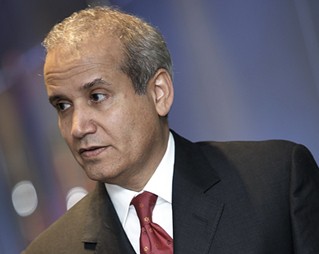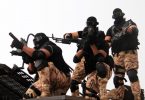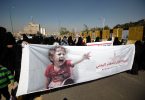Nearly two decades ago, relations between a small group of Houthis, in north Yemen, and Iran, was established with encouragement of the then Yemeni president Ali Abdullah Saleh. The relations were established as a balancing act based on the premise that different sects compete against each other in this region. Years later, Iranians turned them into their proxy and a group that supports them politically.
Subsequently, they became a problem for Saleh’s government who linked them to religious groups in Iran and got them involved in various wars. After being president for 40 years, Saleh was ousted during what came to be known as the Arab Spring in 2011. He also sustained injuries in an assassination attempt against him.
Later on, Saleh allied with his Houthi rivals and seized power by force. They now govern almost half of Yemen. This is a summary of the Houthi story, which is now part of the war situation in Yemen. This raises questions that cannot be underestimated during serious negotiations going on to find a solution to the conflict in the country.
Perhaps the most important question, which must be raised, is about the future of the Houthis as they are a dangerous group. They serve Iran’s interests by playing a role in an expanded regional game in which Iran uses its proxies in Iraq, Syria, Lebanon, Bahrain and Palestine.
On the ground, Houthis are a strong military unit that expanded until they reached Aden in the south, 800 kilometers away from their center in the Saada province. The first thing they did after staging the coup was seizing the Yemeni army warehouses and transferred weapons to areas controlled by them. As a result, they owned a huge arsenal overnight. It is obvious that the Iranians have prepared them for this day.
During the years ahead, whether the war continues or peace prevails, it will not be easy for Houthis to impose themselves as a dominating power
Abdulrahman al-Rashed
There are reports which confirm that Hezbollah trained around 3,000 Houthi fighters during the period which followed their war with Saudi Arabia in 2009. It launched television stations and websites for them and helped them manage their local areas. The Iranians are trying to manipulate the Houthi situation in Yemen in a way that they become like Hezbollah in Lebanon i.e. a military power that can be managed from Tehran.
The Houthis are the Iranian pocket project inside Yemen and south of Saudi Arabia. They are similar to Hezbollah which controls the Lebanese state and which the Iranians militarily use against Israel to serve their political aims. This picture has become clear and many of those who doubted it at the beginning of the Yemeni war now accept it. These people also doubted that Iran was militarily present in Syria but Tehran later officially acknowledged its presence.
A failed project
I think the Houthis are a failed project and, despite Tehran’s efforts, they will not be like Hezbollah for several reasons. The organization in Yemen was named Ansar Allah, similar to Hezbollah, and were taught similar propaganda by using slogans such as “death to America, death to Israel.”
Its religious curricula were taught in schools, they were trained, their leaders were chosen, they were trained for fighting and arms were supplied to them. Despite this Iranian perseverance, the big obstacle is that Yemen is not Lebanon and is in fact very different from it. Houthis are a small minority in a big society. During the years ahead, whether the war continues or peace prevails, it will not be easy for Houthis to impose themselves as a dominating power.
Houthis constitute only 5 percent of the population and they live in the Saada province which is very far from the state’s center. This will weaken their ability to play a pivotal role in a country with difficult terrains. Hence domination will be almost impossible without completely seizing power in suitable circumstances. Apart from these, they also believe in a small branch which the Zaidiyyah, the major sect in north Yemen, does not approve of.
The secret behind Hezbollah’s influence is Israel’s occupation of south Lebanon, which justified its establishment and allowed legitimacy to resistance. However, this is not the case with Houthis as Saudi Arabia has been Yemen’s biggest supporter when it used to be a monarchy and even after it became a republic.
Millions of Yemenis do not have an alternative to their neighbor and a market, which is Saudi Arabia. All this puts the Houthis in a different situation than that of Hezbollah in Lebanon.
I am certain that stability in Yemen will weaken the Houthis. War is what grants them a role and what gives them value. By cooperating with Yemen’s political and religious leaders it is possible to diminish their presence and tame them.
This article was first published Asharq al-Awsat on Nov. 01, 2016.
____________________
Abdulrahman al-Rashed is the former General Manager of Al Arabiya News Channel. A veteran and internationally acclaimed journalist, he is a former editor-in-chief of the London-based leading Arab daily Asharq al-Awsat, where he still regularly writes a political column. He has also served as the editor of Asharq al-Awsat’s sister publication, al-Majalla. Throughout his career, Rashed has interviewed several world leaders, with his articles garnering worldwide recognition, and he has successfully led Al Arabiya to the highly regarded, thriving and influential position it is in today. He tweets @aalrashed
Original Article






